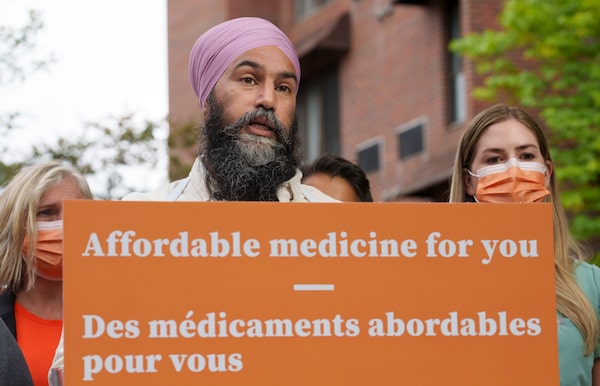
NDP Leader Jagmeet Singh responds to a question during a news conference in Thunder Bay, Ont. on Aug. 27, 2021.Paul Chiasson/The Canadian Press
NDP Leader Jagmeet Singh sidestepped a question on Friday about whether he still stands by his statement from earlier this year that he would not support a minority Conservative government led by Erin O’Toole.
At a campaign stop in Thunder Bay, Ont., Mr. Singh spoke about his party’s pharmacare plan and then took questions from reporters, including one who asked if he is still determined that the NDP would never prop up the Tories.
“I’m running to become prime minister,” Mr. Singh said in response. “As prime minister, my goal would be to deliver help for people. I want to focus on that.”
In February, Mr. Singh told the Toronto Star he would not support a Conservative minority: “absolutely rule that out – period,” he was quoted as saying. “I don’t see any alignment with the Conservatives … to be able to work together.”
In 2019, Mr. Singh said he would not work with then-Conservative leader Andrew Scheer if his party won a minority government. Nearly two weeks into the 2021 election campaign, however, Mr. Singh did not take the opportunity to shut the door on the possibility of working with the party after the Sept. 20 election.
‘Everyman’ Erin O’Toole might yet win over Canadians
Why aren’t we talking about Indigenous communities during Canada’s election campaign?
His comments come as recent polling shows the Conservatives in a virtual tie with the Liberals. The latest survey results for Nanos Research show the Conservatives at 34 per cent support, the Liberals at 33 per cent, the NDP at 20 per cent, the Bloc Québécois and Greens at five per cent and the People’s Party of Canada at three per cent.
The random telephone survey of 1,200 Canadians was sponsored by The Globe and Mail and CTV. Nanos surveys 400 people each evening, and the most recent results were gathered on Aug. 26. Each time a new day of results is added, the results of the oldest day are dropped. The survey’s margin of error is plus or minus 2.8 percentage points, 19 times out of 20.
Survey participants were asked: “If a federal election were held today, could you please rank your top two current local voting preferences?”
The NDP has never formed the government federally, and its leaders have approached the question of how they would handle minority Parliament scenarios in various ways.
NDP strategist Sally Housser said the question of the party supporting either the Liberals or the Conservatives comes up frequently in elections.
Being in the middle of a campaign during a pandemic, Ms. Housser said, creates different considerations for a political party. “Things are not going particularly well for the Liberals,” she said, adding that in February (when Mr. Singh said he would not work with the Conservatives), it looked like the Liberals were in a strong position.
Ms. Housser added that answering a hypothetical question like that can also be difficult because it might take away from the party’s own message. “You want to keep the focus as much as possible on what you’re offering,” she said. “The offer is not: I’m going to prop up the Liberals or I’m going to prop up the Conservatives.”
At his Friday campaign stop in Thunder Bay, Mr. Singh spoke about his party’s plan for universal pharmacare, and said it would save Canadian families at least $500 each month.
In its “Ready for Better” platform document, which has yet to be fully costed, the NDP pledges to provide pharmacare coverage that is financed by a public insurance system and is free at the point of care for Canadians.
“There’s a particular piece of our health care system that’s missing,” Mr. Singh said. “Many people can’t afford the medication they need to get well.”
Mr. Singh said the Liberals had previously promised universal pharmacare but had not made it a reality. He was also asked if medical cannabis would be included in the NDP’s universal pharamacare plan, and he confirmed that the plan would cover prescribed medical cannabis.
Also on Friday, former NDP MP Ruth Ellen Brosseau announced she is running again for the party in the riding of Berthier-Maskinongé in Quebec. Ms. Brosseau was first elected in 2011 during the “orange wave” when the NDP took 59 seats in Quebec, and served until 2019, when Yves Perron won the seat for the Bloc Québécois.
Know what is happening in the halls of power with the day’s top political headlines and commentary as selected by Globe editors (subscribers only). Sign up today.
 Menaka Raman-Wilms
Menaka Raman-Wilms